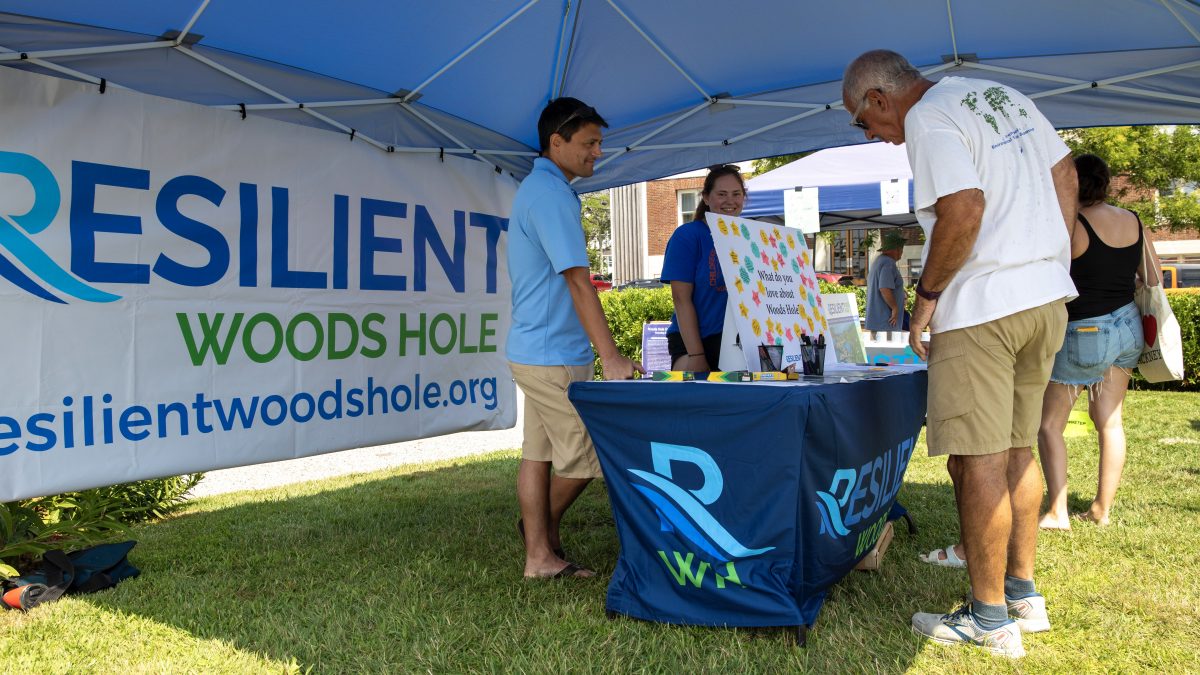Resilience efforts take off nationwide, what have we learned on Cape Cod?
 ResilientWoodsHole ambassadors invite community members to join their efforts at the Woods Hole Science Stroll. (Photo by Jayne Doucette, ©Woods Hole Oceanographic Institution)
ResilientWoodsHole ambassadors invite community members to join their efforts at the Woods Hole Science Stroll. (Photo by Jayne Doucette, ©Woods Hole Oceanographic Institution) September 19, 2024
ResilientWoodsHole utilizes science and community to take on the impacts of climate change
Woods Hole, Mass. – The ResilientWoodsHole (RWH) Climate Walking Trail is celebrating its first anniversary. Since its opening in October 2023, the 2.2 mile self-guided tour has hosted approximately 1,500 visitors. Taking participants to some of the most flood-prone areas of Woods Hole, the trail draws attention to important issues the village is and will be facing as the impacts of climate change become more apparent.
Community members are joining the effort, helping with education, flood-proofing demonstrations, and outreach. Many of them have personally seen the impacts of sea-level rise in the area. While most of them want the Woods Hole they know and love to stay the same, they understand climate-induced change will happen and local adaptation is necessary.
"As a third-generation resident, the future of Woods Hole is important to me. We have seen rising sea levels and increased flooding,” said RWH Community Liaison Pam Harvey. “Through the ResilientWoodsHole initiative, we have come together as a community to study, plan, and begin to implement measures to address climate change impacts."
According to analytical work performed by the Woods Hole Group, it's estimated that as soon as 2070, one-third of the roads in the community could be inundated during storms, with $284 million in property at risk. According to the NOAA tide gauge on the Woods Hole Oceanographic Institution's dock, the village has experienced a sea level rise of more than a foot from 1932-2023. This trend is predicted to accelerate, including an increase in so-called sunny day flooding events, which is when low-lying areas flood during high tides even in the absence of storms.
"Sea-level rise affects the entire community, which is why it’s important to have the entire community involved in solutions," said Leslie-Ann McGee, Project Director for ResilientWoodsHole. "While RWH is working on flood barriers and dune restoration, we need volunteers to help expand our efforts. We’re looking for community members to lead climate tours, represent us at events like the Woods Hole Science Stroll, and educate others about the urgent challenges of rising sea levels. Together, we can build a more resilient future for Woods Hole."
Unlike large city resiliency efforts, RWH is a private-public collaboration between science institutions (including Woods Hole Oceanographic Institution, Marine Biological Laboratory, and NOAA’s Northeast Fisheries), local businesses, residents, and other stakeholders. Supported by a best-in-class analytical partner, Woods Hole Group, and a representative Steering Committee, the RWH Initiative has gained momentum through grassroots community participation. The group hopes to lead by example, from science to solutions, to show how private institutions and community members can lead the charge to secure their collective futures.
Passionate individuals looking to make a meaningful impact can join the group as a volunteer RWH Ambassador. Get more info here: go.whoi.edu/rwh-volunteer
